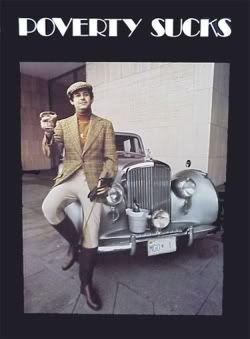I am not usually a reader of magazines except when waiting in places like doctor’s offices or for routine car repair, but a particular column in The Atlantic fairly jumped out at me yesterday while running errands. Provocatively entitled “Did Christianity Cause the Crash?“, immediately I wondered what Christianity the author was referring to when making such a sweeping pronouncement. As it turns out, it’s a particularly curious hybrid strain that synthesizes radical optimism and personal gain at the expense of hard truths or self-awareness. In that regard, it could not be more indicative of the modern age, in all of its faults and promises of salvation through riches. Moreover, in this epoch where instant gratification reigns, perhaps it was inevitable that this petard preaching material gain was hoist.
Though centrally based around an emerging Catholic congregation catering specifically to recent Latino immigrants, in her compelling article author Hanna Rosin draws in disparate strains of different denominations to make an interesting and ultimately damning point.
America’s churches always reflect shifts in the broader culture, and Casa del Padre is no exception. The message that Jesus blesses believers with riches first showed up in the postwar years, at a time when Americans began to believe that greater comfort could be accessible to everyone, not just the landed class. But it really took off during the boom years of the 1990s, and has continued to spread ever since. This stitched-together, homegrown theology, known as the prosperity gospel, is not a clearly defined denomination, but a strain of belief that runs through the Pentecostal Church and a surprising number of mainstream evangelical churches, with varying degrees of intensity.
In Garay’s church, God is the “Owner of All the Silver and Gold,” and with enough faith, any believer can access the inheritance. Money is not the dull stuff of hourly wages and bank-account statements, but a magical substance that comes as a gift from above. Even in these hard times, it is discouraged, in such churches, to fall into despair about the things you cannot afford. “Instead of saying ‘I’m poor,’ say ‘I’m rich,'” Garay’s wife, Hazael, told me one day. “The word of God will manifest itself in reality.”
I find this belief system, if one could truly call it that, particularly troubling and problematic, considering that there are any number of verses of Scripture and words of Jesus I could invoke to directly contradict it. The most obvious citation and one that likely jumps out to those with a strong Christ-centered background is, of course, from the Gospel of Matthew.
“No one can serve two masters. Either he will hate the one and love the other, or he will be devoted to the one and despise the other. You cannot serve both God and Money.
I am surprised certainly at how unapologetic is this emphasis on personal finance and wealth, since the model used by many churches is a much more insidious one. The most flagrant perversion is found within conventional Protestant Christianity and is known as the Edifice Complex. In it, individual salvation is closely linked with coughing up enough money into the collection plates to buy the brand new multimillion dollar building being pushed by the minister and certain well-connected committee members. A singular focus upon a new house of worship takes precedent, is set into motion, and is awaited with a kind of rapturous Messianic zeal. Plans are drawn up, each stage is announced with much fanfare, updates are frequently provided on how much money has been donated to cover the expense, and it is implied strongly and frequently that all problems will be easily solved by more square footage. The tactic is almost always justified by stating that unchurched people will be drawn into the fold and as a result souls will be saved. Of course, paying for it all over time, in addition to such matters as an notable increase in monies devoted to utilities, mortgage payments, and routine upkeep would certainly require greater participation and increased numbers in the pews, but these are often vulgar, cynical conclusions few dare to draw openly or, for that matter, vocally.
It is not all that surprising that the prosperity gospel persists despite its obvious failure to pay off. Much of popular religion these days is characterized by a vast gap between aspirations and reality. Few of Sarah Palin’s religious compatriots were shocked by her messy family life, because they’ve grown used to the paradoxes; some of the most socially conservative evangelical churches also have extremely high rates of teenage pregnancies, out-of-wedlock births, and divorce. As Garay likes to say, “What you have is nothing compared to what you will have.” The unpleasant reality-an inadequate paycheck, a pregnant daughter, a recession-is invisible. It’s your ability to see beyond such things, your willing blindness to even the most hopeless-seeming circumstances, that makes you a certain kind of modern Christian, and a 21st-century American.
At times I have found criticism from those who are not people of faith a little annoying and self-righteous, but still do try to give credence to their concerns, many of which are well-founded. If, for instance, one assumes that religion, or for that matter, Christianity is little more than a panacea of positive thinking or a snake-oil curative based on this example, I can hardly fault them for it. True believers have always had to contend with distortions of the truth formulated to suit the ends of those who manipulated followers to advance their own ends, which often involved material gain. It is unfortunate that tunnel-vision suffices for real faith in the eyes of the deluded, though I fault those who advance it, not those who cling to it.
Later in Matthew,
While Jesus was having dinner at Matthew’s house, many tax collectors and “sinners” came and ate with him and his disciples. When the Pharisees saw this, they asked his disciples, “Why does your teacher eat with tax collectors and ‘sinners’?” On hearing this, Jesus said, “It is not the healthy who need a doctor, but the sick. Learn what this means: ‘I want mercy, not sacrifices.’ For I have come to urge sinners, not the self-righteous, back to God.
I remember that when I was in high school I had a friend who grew up in a very conservative Evangelical family. Underneath the piety, however, was a kind of dysfunction utterly at odds with the stability which they espoused. The mother and father had been long divorced and so my friend lived with his mother in an always cluttered house packed floor to ceiling with junk and unorganized possessions. She used divine revelation and divine direction as justification to leave the country for long periods of time. No matter whether or not she had the money or the need to engage in weeks-long mission trips to remote corners of the globe, her rationalization was that God meant for her to go and since she wanted to go, He would provide for the messy details like funding or making sure her son had the support he needed. Upon reading this article, this anecdote from my own life entered my mind and I am saddened to think that what I considered delusional eccentricity might be far more commonplace then I had ever dreamed.
The Atlantic article focuses on a member of this Charlottesville, Virginia, Latino Catholic congregation by the name of Billy Gonzales, whose requisite devotion to the Prosperity Gospel raises some major red flags in the eyes of this reader.
By many measures, Billy Gonzales does not have it all. He lives with his wife and three children in a tiny apartment on the back side of a development at the edge of town, where people hang out on the stoop until all hours. He works 45 minutes away and his car has been broken down for three months, and he does not have any money to fix it. Every day at work he is faced with a vision of what he does not have. He works for a man who just built a $4 million house-one of four the man owns. Gonzales’s job is to make sure every wine glass, garden statue, and book is dusted and in its proper place. Yet when I talked to Gonzales he was like a child hearing the ice-cream truck, or a man newly in love. “I’m crazy! Just crazy,” he said, meaning crazy for the Lord, and giving little jumps out of his chair.
“I want to buy a house,” he confessed to me one evening this summer. It turned out his lease was almost up, and he needed to move in the fall. “Not a small one but a really huge one, a nice one. With six bedrooms and a kitchen and living room. I know, it’s crazy! But nothing is impossible! God, you saved my life,” he said, no longer speaking to me. “You saved my life, and now you will give me a gift. Now I’m crazy!” Last I heard, he and Garay were house-hunting together.
The narrative that has been advanced in our society since roughly World War II is that religion is detrimental and thus it ought to be jettisoned and disregarded. This has found favor particularly in liberal circles and continues to be pushed hard, since it is easy to provide a new example of how religious intolerance holds back progress or controls people to maintain its own power. When riding the bus yesterday here in DC, I came across a very visible ad for Humanism. It fairly dripped with optimism, smiling faces, calm colors, and good cheer, stating that it is possible for a person to be good without having to have a belief in God or a higher power at all.
In my opinion, I believe that it is entirely possible to be a model citizen without a belief in a higher power, but I suppose I simply have a hard time entertaining the notion that humans when in groups are capable of staying grounded and remaining focused in their efforts to assist everyone. One needs only look at the artifice we have created in government to see the confusion, the inequality, and above all, the needless complications that resort when peoples’ stated agenda at the outset is egalitarianism which ends up by the end nothing remotely like it. What often starts with the best of intentions concludes with a finished product that pleases no one.
Going back to Gonzales, what strikes me as a supreme tragedy is this particular passage, which flies in the face of much biblical teaching and, to be fair, much teaching of other religions.
He told me he feels pity for his employer. He assumes the man must have been close to God at one point, or at least his family must have been, “because the rich are closer to God.” But now the man has lost his way. He laughs when Gonzales talks to him about Jesus, and he wastes his money, buying $500 birdhouses and hiring Gonzales to clean them.
This story begs to be contradicted and my selection of the passage below should come as no surprise.
Now a man came up to Jesus and asked, “Teacher, what good thing must I do to get eternal life?” “Why do you ask me about what is good?” Jesus replied. “There is only One who is good. If you want to enter life, obey the commandments.”
Jesus answered, “If you want to be perfect, go, sell your possessions and give to the poor, and you will have treasure in heaven. Then come, follow me.” When the young man heard this, he went away sad, because he had great wealth. Then Jesus said to his disciples, “I tell you the truth, it is hard for a rich man to enter the kingdom of heaven.
Again I tell you, it is easier for a camel to go through the eye of a needle than for a rich man to enter the kingdom of God.” When the disciples heard this, they were greatly astonished and asked, “Who then can be saved?” Jesus looked at them intently and said, “For humans this is impossible, but for God all things are possible.”
The long and short of it is that religion isn’t meant to be a consistent warm fuzzy. That’s not the point. Jesus called out the leaders of his day and age, which directly led to his death on a cross. All or nothing thinking transforms religion either to a nonstop bummer trip of hypocrisy and thought control or a kind of willing Utopia adopted by believers desperate for a break from the travails and stressors of the world. We are taught, poetically, that to everything there is a season. Sometimes we need encouragement, sometimes we need to be aware of our own frailties, sometimes we can delight in joy, sometimes we need to be held accountable for our transgressions, but we don’t need a retelling of the bootstrap mythology based on a oversimplified interpretation of scripture.
A notable criticism of all of the monotheistic religions is that they are Paternalistic and at times needlessly meddling. I admit that the intention of the Gospels has been twisted to state “I know better than you do”. Still, focusing specifically on what Jesus taught, the ultimate intention in the beginning was that of empowerment, not subordination. No teacher desperate to be worshiped or admired would have stated that whomever exalts himself or herself will be humbled and whomever humbles himself or herself will be exalted. It is a corruption of original intent that leads many away from faith and towards a gospel preaching riches, while in the process forsaking the Golden Rule. The American Dream as realized begins with the Protestant work ethic, but takes a sharp detour along the way.
To conclude, a message for false teachers and corrupt politicians.
“The teachers of the law and the Pharisees sit in Moses’ seat. So you must obey them and do everything they tell you. But do not do what they do, for they do not practice what they preach. They tie up heavy loads and put them on men’s shoulders, but they themselves are not willing to lift a finger to move them. Everything they do is done for men to see: They make their phylacteries wide and the tassels on their garments long; they love the place of honor at banquets and the most important seats in the synagogues; they love to be greeted in the marketplaces and to have men call them ‘Rabbi.’
“But you are not to be called ‘Rabbi,’ for you have only one Master and you are all brothers. And do not call anyone on earth ‘father,’ for you have one Father, and he is in heaven. Don’t make others call you a leader, because you have only one leader, the Messiah. The greatest among you will be your servant.

 So here’s the deal. Grab your bootstraps and pull as hard as you can. Elbow everybody else out of the way, and climb over any mountains of bodies in your way. Or stomp them if they won’t be reasonable and just die.
So here’s the deal. Grab your bootstraps and pull as hard as you can. Elbow everybody else out of the way, and climb over any mountains of bodies in your way. Or stomp them if they won’t be reasonable and just die. Give up your whining socialist fantasies and screw the suckers. Be a real self made man or woman. The brass ring is there just waiting for you to grab. You can do this!
Give up your whining socialist fantasies and screw the suckers. Be a real self made man or woman. The brass ring is there just waiting for you to grab. You can do this! 
